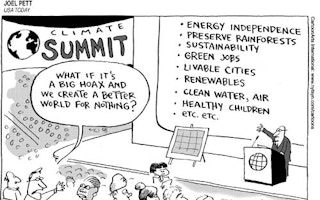Over breakfast on a media trip earlier this month, I was chatting to a fellow journalist from Malaysia when the topic took a turn to focus on climate change. Mid conversation, he suddenly interjected: “Frankly, all this Al Gore and climate change stuff… it’s bullsh*t.”
To continue reading, subscribe to Eco‑Business.
There's something for everyone. We offer a range of subscription plans.
- Access our stories and receive our Insights Weekly newsletter with the free EB Member plan.
- Unlock unlimited access to our content and archive with EB Circle.
- Publish your content with EB Premium.
Referring to the United States former vice president Al Gore’s 2006 documentary - An Inconvenient Truth - on climate change, (largely credited for putting a global spotlight on the issue at that time), my companion went on to explain that the movement of heavy salt water between the northern and southern hemispheres is causing global warming, not man-made activities.
He then asked if I had read the late US writer Michael Crichton’s book State of Fear, which had an “interesting perspective on climate change”.
Later, on Googling the novel, I discovered the 2004 thriller focuses on a group of eco-terrorists plotting mass murder by creating fake natural disasters to publicize the dangers of global warming. Despite being a work of fiction, it contains many graphs and footnotes, portraying a sense of reality and grasp in climate science when the opposite is true.
The novel, which was the #1 best-seller on Amazon for a week in January 2005, was widely slammed by critics as being “error-filled and distorted”, with one describing it as “PR porn for global warming deniers”.
Slight bemusement aside (that my companion was citing fiction to back up his arguments), the incident demonstrated that despite the progress made in recent years, when it comes to climate change, there is still a lot of misinformation and distortion out there.
The great “debate”
Earlier this month, news broke that as early as 1977, senior scientists from United States oil giant Exxon had warned that the burning of fossil fuels was influencing the climate.
Pulitzer Prize-winning website InsideClimate News published the first in a series of stories revealing what some US media has dubbed “Exxon’s climate concealment”.
In the wake of this revelation, there are now growing calls for Big Oil to be excluded from any global or national policymaking on climate change altogether.
Co-founder of non-profit 350.org Bill McKibben, in a separate commentary, draws parallels with the tobacco industry. In 1996, lawsuits forced tobacco firms to release internal documents which showed they knew as early as the 1950s that cigarettes caused cancer.
The industry had then deliberately misled the public to protect its interests, which delayed regulation. This disclosure - and the eventual exclusion of Big Tobacco from any policymaking - finally led to overdue government regulation on smoking and transformed the global public health landscape.
The expose on Exxon should trigger the same for climate change.
Documents collected and interviews conducted with retired employees and officials show that the company, now ExxonMobil, knew about the possible effects of fossil fuels on global warming decades ago.
Then, facts began to emerge on the impact of accumulated greenhouse gases on warming cycles. The scientific community became more vocal about the potential threat of human-driven climate change.
Exxon - along with other Big Oil companies - responded by embarking on a multimillion-dollar campaign, which started in the 1990s and apparently still continues today - to suppress and confuse the science and to lobby governments not to take action to curb fossil fuel usage.
This has added an interesting lens to the great climate change debate. For decades, this debate revolved around whether it was scientific fact or fanciful conjecture that human action leading to higher carbon emissions was responsible for warming the climate. The world is only now beginning to realise the leading role Big Oil has played in creating this “debate”, which an overwhelming majority of scientists say by now is based on fact, not conjecture.
These Big Oil-backed institutions cast doubt on climate change to the point that there has been no meaningful progress since the United Nations Framework Convention on Climate Change (UNFCCC) was adopted in 1992 by the international community to implement global policies to tackle the issue.
Twenty international meetings have been held since then. This December in Paris, world leaders will once again gather for the 21st Conference of the Parties, or COP21, to attempt to ink a global agreement on climate change. There should be no place for Big Oil at such a meeting.
In the years since the debate was first sparked, the evidence has got stronger, with 97 per cent of climate scientists agreeing that man-made carbon emissions are causing climate patterns to change adversely.
According to US space agency Nasa and the National Oceanic and Atmospheric Administration, which samples temperatures across the globe, 2014 was the hottest year on record since 1880 - the earliest year for global records - and 2015 is on course to break that. Fourteen of the warmest years on record have happened this century, and nine of the 10 warmest years have been since 2000.
Across the globe, climate change is already happening - contrary to naysayers who paint it as a figment of imagination, or an uncertain problem in the distant future.
While some countries do benefit from increased temperatures, many more suffer as a result of negative disruptions to their agricultural, health and environment ecosystems.
Land ice at both poles and in glaciers around the world are melting at an accelerated rate, contributing to sea level rise, and there have been more hurricanes, droughts and floods, which scientists have linked to climate change factors, driving millions from their homes, such as in low-lying Bangladesh.
Climate change effects, if unchecked, will continue to undermine global political stability. The current war in Syria -and the unfolding European migrant crisis - has been linked by new credible studies to climate-induced prolonged drought.
Juxtaposed against these unpalatable stories, climate change deniers offer persuasive counter-arguments. That, in fact, humans cause a negligible amount of carbon emissions compared to natural ecological cycles, that climate change is an excuse for governments to impose taxation and regulation on companies, and that eco-guilt is a 21st century first world luxury.
Underlying the attacks, the message is always the same: “There’s nothing wrong with business as usual. Let’s continue to plunder and pollute without consequence.”
Trump card
How should we respond to this debate? I would argue that as responsible global citizens, we have a moral duty to study the arguments and draw conclusions supported by scientific evidence - and not be swayed by junk science or persuasive half-truths.
Encouragingly, surveys around the world show that climate change awareness is rising. In Singapore, a survey by the National Climate Change Secretariat in 2013 showed that 70 per cent of 1,000 residents were concerned about climate change - a majority, even though this same number fell slightly from 74 per cent in a similar 2011 survey.
A recent Pew Research Centre survey - conducted in 40 countries with about 45,000 respondents - released in July measuring perceptions of international challenges showed that many countries named climate change as a top threat, especially in Latin America and Africa.
Public understanding and pressure are vital to press political leaders to negotiate a successful outcome in Paris.
In this “sceptics versus advocates” battle to win the hearts and minds of the global public, the latter group has one ultimate trump card.
Regardless of whether human actions cause global warming, the fact is that a world powered by more renewable energy, which puts a price on environmental and social costs, is simply a superior one.
Our collective aspiration for a greener, cleaner, more sustainable planet that safeguards humanity’s future is a powerful force for change.
The truth is, our planet will survive. It has done so for millions of years despite experiencing cataclysmic climate changes in its history.
The bigger question is whether we can say the same for humanity.
A version of this column was first published in The Straits Times.









